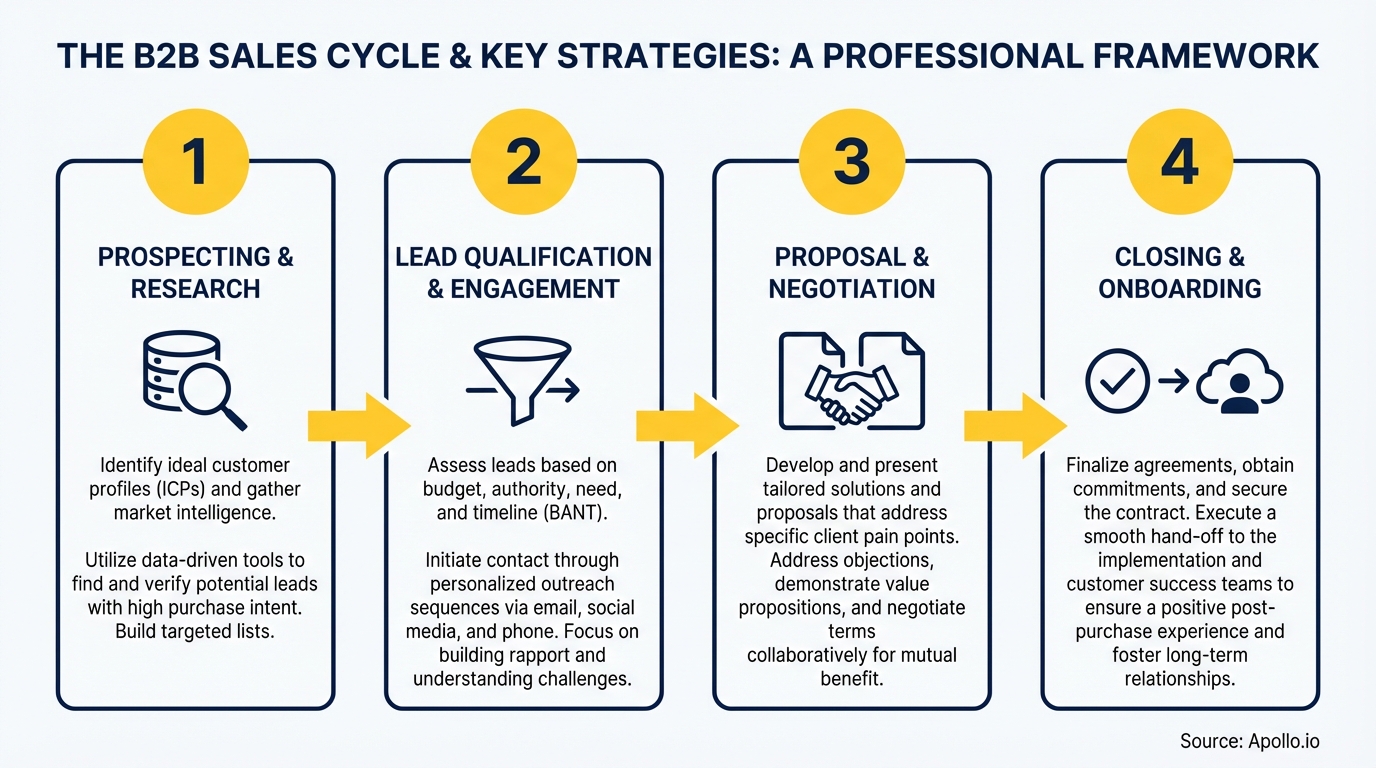What Is B2B Sales? The 2026 Guide to Modern Business Selling

What Is B2B Sales? The 2026 Guide to Modern Business Selling
B2B sales (business-to-business sales) is the process of selling products or services from one company to another. Unlike consumer sales, B2B transactions involve longer sales cycles, multiple decision-makers, and higher transaction values.
In 2026, B2B selling has fundamentally shifted: buyers complete most research independently, AI handles routine tasks, and sellers focus on strategic guidance rather than information delivery.
According to BookYourData research, 80% of B2B sales interactions between suppliers and buyers now occur through digital channels. This transformation demands new skills, tools, and strategies from sales teams.

Stop Chasing Dead Leads—Find Verified Contacts
Tired of wasting hours verifying contact info? Apollo delivers 224M contacts with 96% email accuracy so your reps spend time selling, not researching. Join 550K+ companies closing more deals.
Start Free with Apollo →Key Takeaways
- B2B buyers complete 69% of their purchase process before engaging sales reps
- Modern B2B sales requires omnichannel presence across an average of 10 touchpoints
- 81% of sales teams now use AI in their processes to automate research and personalization
- Irrelevant outreach actively damages pipeline: 73% of buyers avoid suppliers who send generic messages
- Sales teams need unified platforms that consolidate prospecting, engagement, and conversation intelligence
How B2B Sales Differs From Traditional Consumer Sales
B2B sales involves distinct characteristics that separate it from B2C transactions. Purchasing decisions require consensus from multiple stakeholders (procurement, finance, legal, end-users), not individual buyers.
Transaction values range from thousands to millions of dollars, justifying longer evaluation periods.
The sales cycle extends from weeks to 18+ months for enterprise deals. Relationships matter: 75% of sales leaders report that leads referred from loyal customers are more likely to close. Buyers demand customization, integration capabilities, and ongoing support rather than off-the-shelf solutions.
"Apollo could be a third of the cost if you look at the full price of what we were spending on ZoomInfo, Outreach, Salesforce, and admins to make it all work."
What Are the Core Stages of the B2B Sales Process?
The modern B2B sales funnel follows five essential stages, though buyers often move non-linearly between them:
| Stage | Key Activities | Primary Goal |
|---|---|---|
| Prospecting | Identify target accounts, build contact lists, research buyer intent signals | Fill pipeline with qualified leads |
| Qualification | Assess fit (budget, authority, need, timeline), prioritize opportunities | Focus resources on winnable deals |
| Discovery | Understand pain points, map stakeholders, identify decision criteria | Position your solution strategically |
| Proposal | Present tailored solution, address objections, negotiate terms | Demonstrate differentiated value |
| Closing | Finalize contracts, coordinate implementation, ensure smooth handoff | Secure commitment and begin delivery |
Research shows 92% of B2B buyers start their journey with at least one vendor already in mind, and 41% begin with a single preferred vendor. This means prospecting and early positioning are more critical than ever.
Need to accelerate your prospecting? Search Apollo's 224M+ contacts with 65+ filters to find your ideal buyers in minutes.
What B2B Sales Strategies Actually Work in 2026?
The shift toward rep-free buying experiences demands strategic adaptation. Three B2B sales techniques consistently deliver results:
Account-Based Selling (ABS): Target high-value accounts with personalized campaigns across multiple channels. ABS aligns sales and marketing around named accounts rather than broad lead generation. Teams using intent data identify which accounts are actively researching solutions.
Consultative Selling: Position yourself as a trusted advisor who diagnoses problems before prescribing solutions. This approach builds credibility when 61% of buyers prefer minimal sales interaction. Your value comes from strategic insight, not product information buyers can find themselves.
Hybrid Selling: According to industry research, hybrid selling (combining remote, e-commerce, self-service, virtual, and in-person interactions) has become the most dominant sales strategy. Buyers use an average of 10 channels, so your presence must span digital and human touchpoints.
"The thing that made me most excited as somebody who's been in sales development a long time was Apollo's integration between sales data and sales engagement and the magic that you can make happen when those two are together on the same platform."

How Is AI Transforming B2B Sales Operations?
Agentic AI has moved from "assist" to "do" in 2026. Sales teams deploy AI agents for prospecting, research, follow-up automation, and content personalization.
This creates a productivity gap: teams operationalizing AI agents dramatically outpace those relying on manual processes.
AI applications in modern B2B sales include:
- Prospect research automation: AI extracts company news, funding events, hiring signals, and tech stack changes to identify buying opportunities
- Message personalization at scale: Generate contextually relevant outreach based on prospect data, reducing the 73% buyer avoidance rate for irrelevant messages
- Conversation intelligence: Analyze calls and meetings to surface objections, competitive mentions, and coaching opportunities
- Workflow automation: Route leads, update CRM records, schedule follow-ups, and trigger sequences based on buyer behavior
However, AI effectiveness depends on data quality. Top-performing teams prioritize data hygiene, deduplication, and system integration to ensure AI outputs are reliable and actionable.
Spending hours on manual research? Let Apollo's AI agents automate prospecting and personalization so you can focus on closing deals.
Turn Forecast Guesswork Into Revenue Certainty
Pipeline forecasting a guessing game? Apollo delivers real-time deal visibility and verified contacts so you predict revenue with confidence. Built-In boosted win rates 10% with Apollo's intelligence.
Start Free with Apollo →What Metrics Define B2B Sales Success?
Effective B2B sales teams track metrics across pipeline health, efficiency, and revenue outcomes. Focus on these core indicators:
| Metric Category | Key Metrics | Why It Matters |
|---|---|---|
| Pipeline Health | Pipeline velocity, conversion rates by stage, average deal size | Predicts future revenue and identifies bottlenecks |
| Activity Efficiency | Activities per closed deal, response rates, meeting-to-opportunity ratio | Measures rep productivity and process effectiveness |
| Revenue Performance | Win rate, sales cycle length, customer acquisition cost (CAC), quota attainment | Validates strategy and informs forecasting |
| Customer Value | Lifetime value (LTV), expansion revenue, retention rate | Drives long-term profitability and growth |
According to Semrush research, growing a high-quality lead pipeline is the number one priority for 37% of B2B marketers. This alignment between sales and marketing on pipeline quality drives better outcomes than focusing solely on volume.
Track your sales analytics to identify which activities correlate with closed deals, then double down on high-impact behaviors.
What Are the Biggest B2B Sales Challenges in 2026?
Modern B2B sales teams face four critical challenges:
Buyer expectations for self-serve experiences: 61% of buyers prefer rep-free purchasing, yet complex solutions still require human guidance. Sales must balance availability with non-intrusive engagement.
Content-sales misalignment: 69% of buyers report inconsistencies between website information and seller messaging. This erodes trust and extends sales cycles. Solution: implement content governance with version control and quarterly audits.
Sales-marketing lead definition gaps: 49% of CSOs report that sales and marketing define qualified leads differently. This misalignment wastes resources and creates friction. Establish shared qualification criteria and regular calibration sessions.
AI skill gaps: 74% of CSOs say significant seller skill changes are required to meet future revenue goals, and 58% of sellers will need AI-related reskilling by 2026. Organizations must invest in training on AI tool usage, prompt engineering, and human-AI collaboration.
How Do You Build a High-Performance B2B Sales Team?
Winning teams in 2026 share common structural elements and operational practices. Start with clear role definition: separate prospecting (SDRs/BDRs), opportunity management (AEs), and account growth (account managers).
Specialization improves efficiency and skill development.
Invest in continuous enablement, not one-time training. Top performers dedicate 15-20% of time to skill development, focusing on consultative questioning, objection handling, and AI tool proficiency. Use conversation intelligence to identify coaching moments and share winning patterns.
Consolidate your tech stack. Teams using unified platforms that combine data, engagement, and intelligence outperform those juggling disconnected tools.
Look for solutions that eliminate manual data entry, provide AI-powered insights, and enable omnichannel outreach.
Real results from consolidation: Apollo customers report measurable improvements when they replace fragmented tools with an integrated go-to-market platform.

Getting Started With Modern B2B Sales
Transform your B2B sales approach in three steps:
1. Audit your current state: Map your sales process, measure conversion rates at each stage, and identify where deals stall.
Survey buyers to understand their preferred channels and pain points with your current approach.
2. Implement omnichannel engagement: Build presence across the 10 channels buyers use (email, phone, social outreach, content, events, self-serve tools, etc.). Use intent data to prioritize accounts showing active buying signals.
3. Operationalize AI: Start with high-impact use cases like prospect research automation and message personalization. Ensure data quality foundations are solid before scaling AI usage. Measure productivity gains and reinvest time savings into strategic activities.
The gap between high-performers and laggards widens in 2026. Teams that adapt to buyer preferences, leverage AI effectively, and maintain trusted advisor positioning will capture disproportionate market share.
Ready to modernize your B2B sales motion? Start free with Apollo to access 224M+ verified contacts, AI-powered personalization, and the only platform that unifies prospecting, engagement, and conversation intelligence in one workspace.
Prove Apollo's ROI In Your First 30 Days
Budget approval stuck on unclear metrics? Apollo delivers trackable pipeline impact from day one—quantifiable meetings booked, deals influenced, and time saved. Built-In increased win rates 10% and ACV 10% with Apollo's intelligence.
Start Free with Apollo →
Cam Thompson
Search & Paid | Apollo.io Insights
Cameron Thompson leads paid acquisition at Apollo.io, where he’s focused on scaling B2B growth through paid search, social, and performance marketing. With past roles at Novo, Greenlight, and Kabbage, he’s been in the trenches building growth engines that actually drive results. Outside the ad platforms, you’ll find him geeking out over conversion rates, Atlanta eats, and dad jokes.
Don't miss these
Sales
Inbound vs Outbound Marketing: Which Strategy Wins?
Sales
What Is a Sales Funnel? The Non-Linear Revenue Framework for 2026
Sales
What Is a Go-to-Market Strategy? The Data-Driven Blueprint That Actually Works
See Apollo in action
We'd love to show how Apollo can help you sell better.
By submitting this form, you will receive information, tips, and promotions from Apollo. To learn more, see our Privacy Statement.
4.7/5 based on 9,015 reviews
